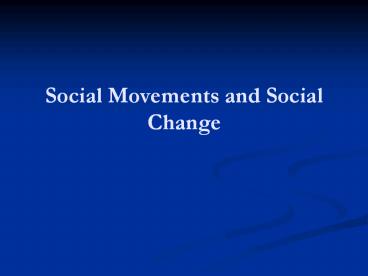Social Movements and Social Change - PowerPoint PPT Presentation
1 / 11
Title:
Social Movements and Social Change
Description:
Social Movements and Social Change Announcements Soc Lexicon: Final Deadline Today, 5 pm! Extensions to PD model Allow for conferencing participants make a pact ... – PowerPoint PPT presentation
Number of Views:122
Avg rating:3.0/5.0
Title: Social Movements and Social Change
1
Social Movements and Social Change
2
Announcements
- Soc Lexicon Final Deadline Today, 5 pm!
3
Extensions to PD model
- Allow for conferencing
- participants make a pact
- Creates even more incentive to defect?
- Multiple iterations
- Dont want to rat out partner, since they might
punish you next time - More actors
- Hope that others will cooperate
4
Generalizing to Groups
- There are large numbers of persons relative to a
particular space - All persons have the same 2 opposing impulses, to
conform (usually the dominant impulse) and not to
conform - It is possible to act non-normatively that is,
it is physically possible to do the non-normative
thing
5
Payoff matrix for groups
P /- G
P -- G -
P G /-
P /- G --
6
Implication of PD models
- Behavior that is rational at the individual level
leads to sub-optimal outcomes at the aggregate
(collective, group) level - Can explain riots and mobs, without attributing
behavior to loss of control - Results in a failure to provide collective goods
7
Collective Goods
- Goods that, if provided, are enjoyed by all,
whether or not they contribute to their provision - Examples
- Commons
- Parks
- PTA
- Picnics
- public television
- clean air
- union negotiated wages
8
Class Union Outcome
P snacks (-) G snacks fun
P out 1 G nada
P free snacks! G snacks
P no loss G no snacks
9
Collective Goods and the Free Rider Problem
Collective good Provided (optimal)
sucker
Sub-optimal outcome
Free rider
10
Free Riders
- Free riders enjoy the benefits of collective
goods without contributing to their provision - It is rational to be a free-rider if you can get
away with it, but if everyone is a free rider,
collective goods will never be provided - Solution to the free rider problem Organization
11
Overcoming the Free Rider Problem
- Organizations may offer Incentives (available
only to those who contribute) to encourage people
to participate - Selective incentives special tangible benefits
available only to members - According to RC, strongest type of incentive
- Solidary incentives promise of strong social
bonds among members, distinction between us and
them - Hard to maintain in large groups
- Value incentives emphasis on intrinsic value of
the work of the organization































